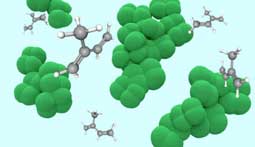Researchers at the University of Nebraska–Lincoln, led by biochemist Nicole Buan, have genetically engineered a species of methanogen – known for emitting methane- that can also yield sizable amounts of isoprene, the primary chemical component of synthetic rubber, and is refined from petroleum.
“We were able to achieve a high yield of renewable isoprene by taking advantage of the naturally high-flux mevalonate lipid synthesis pathway in anaerobic methane-producing methanogens, “ the researchers stated. “Our study illustrates that by genetically manipulating Methanosarcina species methanogens, it is possible to create organisms that grow by producing the hemiterpene isoprene. Mass balance measurements show that engineered methanogens direct up to 4% of total carbon flux to isoprene, demonstrating that methanogens produce higher isoprene yields than engineered yeast, bacteria, or cyanobacteria, and from inexpensive feedstocks. Expression of isoprene synthase resulted in increased biomass and changes in gene expression that indicate that isoprene synthesis depletes membrane precursors and redirects electron flux, enabling isoprene to be a major metabolic product. Our results demonstrate that methanogens are a promising engineering chassis for renewable isoprene synthesis”, they said.
According to Buan, the methanogens require no light and oxygen. The methanogen species Methanosarcina acetivorans and the gene of a poplar tree that can convert up to 10% of its carbon into isoprene. It has been suggested to call it isoprenogen, “because it’s really a new type of organism and there’s no other organism that grows by producing isoprene gas, “ according to Buan.

